grade7unit2知识点
译林版七年级上册Unit2重点词组及句子翻译

译林版七年级上册Unit2重点词组及句子翻译1. Do you like any sports?2. I walk to my bowl many times a day.3. The Class1, Grade7 students are writing abouttheir favourite sports.4. I’m good at playing tennis.5. What’s your favourite sport? = What sport do you like best?6. I go swimming every week. (How often do you go swimming?)7. I love sports, and I like football very much. 8. Li Hua is my favourite foo tball star.9. He is a new member of Huanghe Football Club. 10. He looks strong and plays football very well. Many people like him.11. In his free time, he studies English. 12. He also enjoys listening to mu sic. 13. It makes him happy.14. Li Hua wants to play in the next World Cup. 15. I hope his dream com es true.16. Who is Simon’s favourite football player? 17. Is Li Hua in any club?18.He`s a new member of Huanghe Football Club. 19. How does he look? = What does he look like? = What is he like?20. Does he play football well?21. Amy goes swimming every week.22. Simon often plays football with his friends. 23. Daniel sometimes watches ball games on TV. 24. Do you paly football at weekends? 25. My dad sometimes watches our games. 26. Sometimes he reads at home. 27. Do your parents go with you?28. My mum often goes shopping at weekends. 29. What sport do you lik e?30. Many of my students like sports.31. Simon likes playing football very much. 32. Daniel does not like sports very much.33. What do you often do after school?34. What else/other things do you like to do? 35. It makes me feel great.36. I read a lot of interesting books/an interesting book.37. Reading is fun. = It’s fun to read. 38. I love sports.39. I am a member of our school basketball team. 40. We often talk abou t basketball and watchbasketball matches on TV. 41. He is my hero.42. Swimming is my favourite sport. 43. Do you often watch matches?44. I need to spend more time on sports/ (in) doing45. spend时间(in)doing/ on sth spend 金钱on sth。
七年级上册英语Unit2知识点归纳总结

七年级上册英语U n i t2知识点归纳总结-CAL-FENGHAI.-(YICAI)-Company One1七年级英语上册Unit2知识点归纳总结Unit2 Topic1 I have a small nose.一、重点词汇1.反义词:small - big / large long - short black - white tall - short new – old2.my/your/his/her favorite film star 我的/你的/他的/她的最喜爱的电影明星e from =be from 来自、出生于4.look different 长得不像5.in the same grade/school 在同一个年级/学校 in different grades/schools 在不同年级/学校6.have / has 有;吃;喝You have big eyes. She has small eyes. 你有一双大眼睛。
她有一双小眼睛。
7.long 长的 long hair 长头发 8.short 短的 short hair 短头发9. big 大的 big nose 大鼻子 10. small 小的 small nose 小鼻子11. round 圆的 round face 圆圆的脸 12. wide 宽的 wide face 宽宽的脸13. we 我们 We have small mouths. 我们都有小嘴巴。
二、重点句型1.I have a big nose = My nose is big.I have big eyes. = My eyes are big.She has a big nose. = Her nose is big.She has big eyes. = Her eyes are big.2. Who’s that boy那个男孩是谁这是由Who引导的特殊疑问句,询问某人的身份。
人教版七年级英语上册Unit7-第二课时教学课件
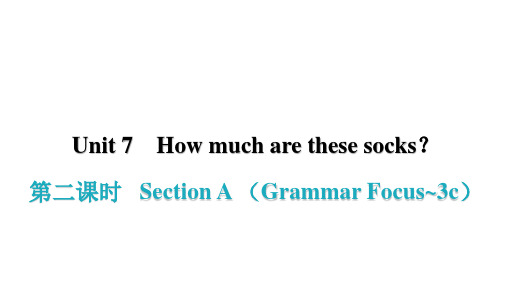
boys,” says Mrs. Hill. “Everything is cheap there.”
( B )16. A. gets
B. get
C. to get
( A )17. A. don't B. aren't C. isn't
( B )18. A. mine
B. my
C. me
“We know,” say the boys, “____19____ we go
课堂小测 一、用所给单词的适当形式填空 1. How much ___is_____ (be) this sweater? 2. My mother's hat is nine _d_o_l_l_a_rs__ (dollar). 3. Do you like these yellow __s_k_i_rt_s__ (skirt)? 4. Her shirt __l_o_o_k_s__ (look) very nice. 5. Look! My __s_h_o_e_s__ (shoe) are under my bed.
基数词的用法
表示数量多少的数词叫作基数词,如one, two, three等。
1. 基数词的拼写
1~9的基数词 11~19的基数词
one
eleven
two
twelve
three
thirteen
整十的基数词 ten
twenty thirty
两位数的基数词 twenty-one twenty-two thirty-three
( A )12. A. Why
B. How
C. When
( A )13. A. are
B. am
2024秋沪教牛津新七年级上第2单元School Life知识点清单(背诵版)

Unit 2 School Life重点词汇—、词性分类1. nounsgeography地理(学)corner角;墙角activity活动club社团skill技术;技能magazine杂志teenager青少年greeting问候;招呼grade年级energy精力;活力drama戏;剧diary日记;日记簿project课题poster海报success成功2. verbspractise练习;训练solve解答develop加强;增强;发展realize意识到mind介意pack打包celebrate庆祝;庆贺3. adjectivesteen青少年的rocky困难的;多岩石的.4. adverbsluckily幸运地;幸好just 恰好二、词性转换1. activity n. 活动—active adj.积极的2. solve v.解答— solution n.解决办法3. develop v. 发展—①developed adj.发达的②developing adj.发展中的③development n.发展4. skill n.技能—skilled/skilful adj.熟练的5. greeting n. 问候—greet v. 问候6. energy n. 精力—energetic adj.精力充沛的7.luckily adv.幸运地—①luck n.运气②lucky adj.幸运的8. celebrate v. 庆祝—celebration n,庆祝活动9. success n. 成功—①succeed v.成功②successful adj成功的③successfully adv.成功地10. rocky adj.困难的;多岩石的—rock n. 岩石三.一词多义1, grade n.年级;成绩v评分 2. mind v.介意n. 头脑3. pack v.打包n. 纸包;纸袋重点短语1. do the dishes洗碗8. on foot步行2. junior high school初级中学9. full of energy充满活力3. take part in (= join in)参与10. get ... ready for准备好.....4. look forward to期待;盼望11. put on举办;上演5. daily life 日常生活12. clean up打扫干净6. go to bed去睡觉13. pick up取(某物)7. get up起床核心句式1.I listen to music and do sport every day.我每天听音乐,做运动。
七年级英语上册 Unit 2 Lets play sports知识点梳理(上)(新版)牛津版

7A Unit 2知识点梳理(上)词汇导入1.my favourite football player ______________________2......的一名新成员______________________3.Huanghe Football Club______________________4. 看上去强壮______________________5.play football very well______________________6.在他的空闲时间______________________7.play in the next World Cup______________________ 8. 使他高兴______________________9.like football very much ______________________ 10.实现,成真;成为现实______________________知识点梳理一.词汇&短语:WORDS&PHRASES1. Eddie, do you like sports? 埃迪,你喜欢运动吗?(1)like及物动词,意为“喜欢”,反义词是dislike,意为“不喜欢”。
我非常喜欢英语。
_______________________________________ I like English very much.【拓展】like的常见用法:like sb. / sth. 喜欢某人/某物I like sheep. 我喜欢绵羊。
like doing sth. 喜欢做某事(表示人的兴趣、爱好及经常性的活动)I like playing football, but today I like to play soccer. 我喜欢打篮球,但是今天我喜欢踢足球。
like to do sth. 喜欢做某事(表示偶然性、一次性的活动)(2)sport此处用作可数名词,意为“体育运动”。
苏教译林七年级英语unit1-2知识点总汇及练习题
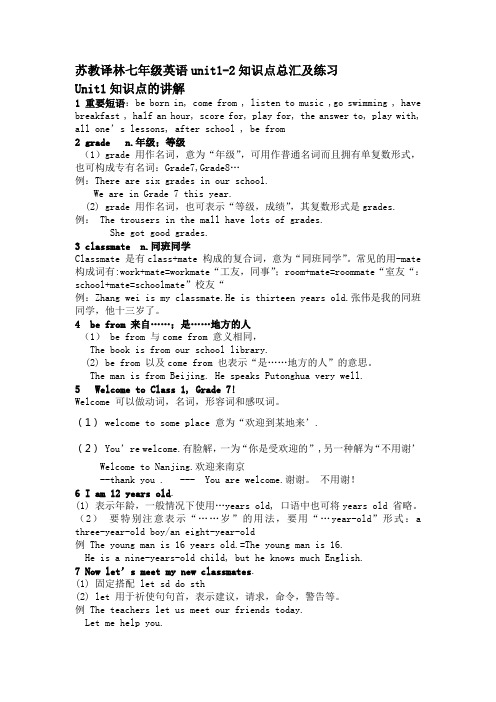
苏教译林七年级英语unit1-2知识点总汇及练习Unit1知识点的讲解1 重要短语:be born in, come from , listen to music ,go swimming , have breakfast , half an hour, score for, play for, the answer to, play with, all one’s lessons, after school , be from2grade n.年级;等级(1)grade用作名词,意为“年级”,可用作普通名词而且拥有单复数形式,也可构成专有名词:Grade7,Grade8…例:There are six grades in our school.We are in Grade 7 this year.(2) grade 用作名词,也可表示“等级,成绩”,其复数形式是grades.例: The trousers in the mall have lots of grades.She got good grades.3 classmate n.同班同学Classmate 是有class+mate 构成的复合词,意为“同班同学”。
常见的用-mate 构成词有:work+mate=workmate“工友,同事”;room+mate=roommate“室友“:school+mate=schoolmate”校友“例:Zhang wei is my classmate.He is thirteen years old.张伟是我的同班同学,他十三岁了。
4 be from 来自……;是……地方的人(1) be from 与come from 意义相同,The book is from our school library.(2) be from 以及come from 也表示“是……地方的人”的意思。
The man is from Beijing. He speaks Putonghua very well.5 Welcome to Class 1, Grade 7!Welcome 可以做动词,名词,形容词和感叹词。
七年级英语下册第二单元知识点归纳Unit2单元归纳
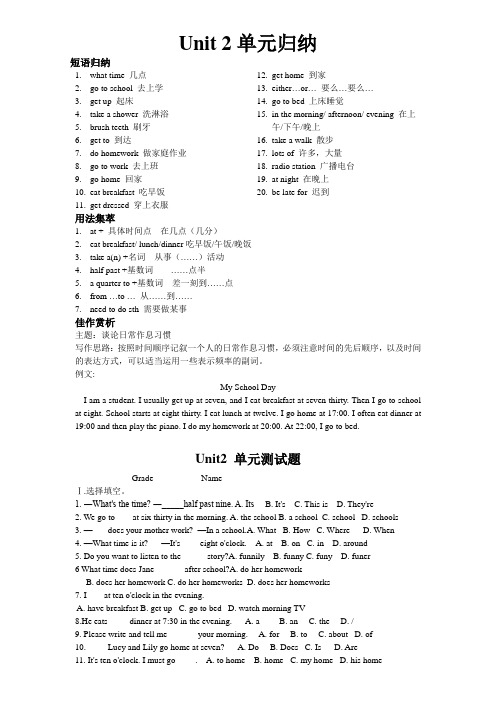
Unit 2单元归纳短语归纳1.what time 几点2.go to school 去上学3.get up 起床4.take a shower 洗淋浴5.brush teeth 刷牙6.get to 到达7.do homework 做家庭作业8.go to work 去上班9.go home 回家10.eat breakfast 吃早饭11.get dressed 穿上衣服12.get home 到家13.either…or…要么…要么…14.go to bed 上床睡觉15.in the morning/ afternoon/ evening 在上午/下午/晚上16.take a walk 散步17.lots of 许多,大量18.radio station 广播电台19.at night 在晚上20.be late for 迟到用法集萃1.at + 具体时间点在几点(几分)2.eat breakfast/ lunch/dinner吃早饭/午饭/晚饭3.take a(n) +名词从事(……)活动4.half past +基数词……点半5. a quarter to +基数词差一刻到……点6.from …to …从……到……7.need to do sth 需要做某事佳作赏析主题:谈论日常作息习惯写作思路:按照时间顺序记叙一个人的日常作息习惯,必须注意时间的先后顺序,以及时间的表达方式,可以适当运用一些表示频率的副词。
例文:My School DayI am a student. I usually get up at seven, and I eat breakfast at seven thirty. Then I go to school at eight. School starts at eight thirty. I eat lunch at twelve. I go home at 17:00. I often eat dinner at 19:00 and then play the piano. I do my homework at 20:00. At 22:00, I go to bed.Unit2 单元测试题Grade________ Name ________Ⅰ.选择填空。
初一英语译林版7A Unit2 let's play sports 同步基础知识梳理+一般现在时特殊用法+完型填空和阅读理解

like doing sth.
喜欢做某事(表示人的兴趣、 爱好及经常性的活动)
like to do sth.
喜欢做某事(表示偶然的、一
次性的活动,类似 want to do
sth.)
(2) sport 此处为可数名词,意为“体育运动”
eg:Tennis is a popular sport. 网球是一项很流行的运动。
eg : What do you want to write about? (3) sb’s favourite … 某人的最喜爱的… 。含义相当于 like best。
注意,一定要用所有格形式。 eg:大卫最喜欢的电影 David’s favourite film
他爸爸最喜欢的书 his father’s favourite book
动词,“走,步行,”可与 on foot 进行同义句转换 He walks to school every day.=
He goes to school on foot every
day.
可数名词,“走,步行”,尤指为娱乐或运动所做的 take/have a walk 散步
“散步”,常构成短语
go for a walk 去散步
eg: He enjoys singing.
Did you enjoy yourself at the weekend?
知识点 8:关于 talk 的用法, talk vi. (P19) talk about sb./sth. 谈论某人/某物 talk to sb. 与某人谈话,强调单向的,另一方不一
talk 定讲话
talk with sb. 与某人谈话,强调双向的,两人都说 话
They are talking about that man. I am talking to Tom.(强调"I"单方面的 对"Tom 在谈话) Don’t talk to me while I am studying. I am talking with Tom.(强调"I"和"Tom" 在相互谈话)
(仁爱版)七年级英语总复习Unit-2知识点、练习和参考答案
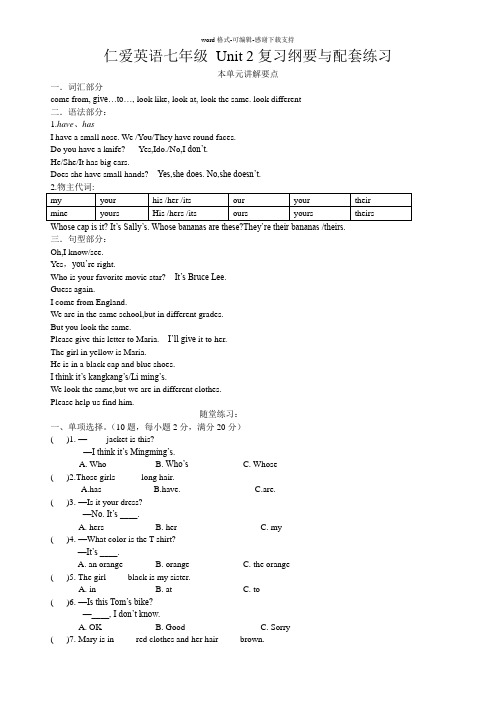
仁爱英语七年级Unit 2复习纲要与配套练习本单元讲解要点一.词汇部分come from, give…to…, look like, look at, look the same. look different二.语法部分:1.have、hasI have a small nose. We /You/They have round faces.Do you have a knife? Yes,Ido./No,I don’t.He/She/It has big ears.Does she have small hands? Yes,she does. No,she doesn’t.Whose cap is it? It’s Sally’s. Whose bananas are these?They’re their bananas /theirs.三.句型部分:Oh,I know/see.Yes,you’re right.Who is your favorite movie star? It’s Bruce Lee.Guess again.I come from England.We are in the same school,but in different grades.But you look the same.Please give this letter to Maria. I’ll give it to her.The girl in yellow is Maria.He is in a black cap and blue shoes.I think it’s kangkang’s/Li ming’s.We look the same,but we are in different clothes.Please help us find him.随堂练习:一、单项选择。
(10题,每小题2分,满分20分)( )1. —____ jacket is this?—I think it’s Mingming’s.A. WhoB. Who’sC. Whose( )2.Those girls _____ long hair.A.hasB.have.C.are.( )3. —Is it your dress?—No. It’s ____.A. hersB. herC. my( )4. —What color is the T-shirt?—It’s ____.A. an orangeB. orangeC. the orange( )5. The girl ____ black is my sister.A. inB. atC. to( )6. —Is this Tom’s bike?—____, I don’t know.A. OKB. GoodC. Sorry( )7. Mary is in ____ red clothes and her hair ____ brown.A. /; isB. a; areC. /; are( )8. —Do you look like your sister?—No, we ____.A. look the sameB. look differentC. look like( )9. —You are nice in this dress.—____A. It’s right.B. No, it isn’t.C. Thank you.( )10.-What does your brother look like?-She has _____nose.A.a big red B .a red big C.red big二、词汇运用。
沪教牛津版七年级英语UNIT2Dailylife
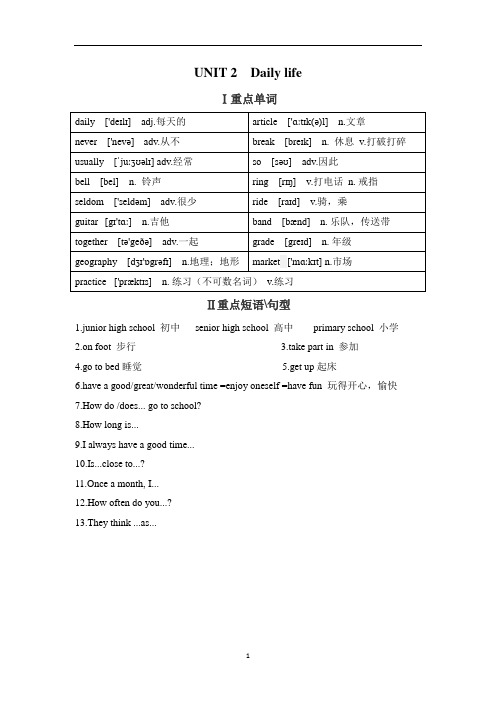
UNIT 2 Daily life1.junior high school 初中senior high school 高中primary school 小学2.on foot 步行3.take part in 参加4.go to bed睡觉5.get up起床6.have a good/great/wonderful time =enjoy oneself =have fun 玩得开心,愉快7.How do /does... go to school?8.How long is...9.I always have a good time...10.Is...close to...?11.Once a month, I...12.How often do you...?13.They think ...as...III详细讲解1. once or twice a week每周一两次注意:在英语中,表示一次用“once”,两次用“twice”,表示三次或者三次以上就用“基数词+times”(time在这里是可数名词,表示次数,需要加“s”)如:once a week,twice a week, three(four/ five…)times a week2. brush one’s teeth刷牙brush ①在这里是动词,表示“刷”②n.可数名词,“刷子”复数形式是“ brushes”。
如:I need some brushes for painting. tooth的复数形式是“ teeth”牙齿(因为每个人刷牙的时候不止刷一颗牙齿,所以要用复数)3.watch television= watch TV 看电视4.ride a bicycle 骑自行车动词短语,交通工具前要加限定词(如a ,the)同义词:by bicycle/bike 介词短语,交通工具前不用加限定词5.be close to 离……近= near =beside= not far away from(上节课学过)6.so在此处用作连词,表示结果“因此;所以”的意思。
新人教版七年级英语上册Starter Unit2知识点总结

千里之行,始于足下。
新人教版七年级英语上册Starter Unit2知识点总结Starter Unit 2 of New Version Primary School English Book for Grade 7 covers the following key points:1. Greetings and introductions:- How to greet someone: Hello, Hi, Good morning, Good afternoon, Good evening.- How to introduce oneself: My name is..., I am ..., Nice to meet you.2. Personal information:- Vocabulary related to personal information: name, age, nationality, phone number, address.- How to ask and answer questions about personal information: What's your name? How old are you? Where are you from? What's your phone number? What's your address?3. Numbers:- Numbers from 0 to 100.- How to ask and answer questions about phone numbers and ages using numbers.4. Classroom items and school subjects:- Vocabulary related to classroom items: bag, book, pencil, pen, ruler, eraser.第1页/共2页锲而不舍,金石可镂。
九年级上册英语第七单元2d知识点

九年级上册英语第七单元2d知识点Unit 7, Lesson 2 of the 9th-grade English textbook introduces us to several key concepts related to traveling and transportation. In this article, we will explore these concepts in depth, providing a comprehensive understanding of the material covered in this lesson.The lesson starts by discussing different modes of transportation. We are exposed to various means of getting from one place to another, such as cars, buses, trains, and airplanes. Each mode of transportation has its advantages and disadvantages. For example, cars offer flexibility and privacy, but they contribute to pollution and traffic congestion. On the other hand, public transportations like buses and trains are environmentally friendly options, but they may lack the convenience and privacy of a personal vehicle.Next, we delve into vocabulary related to traveling and transportation. Knowing the correct terms is essential when communicating in a foreign language. We learn words such as "departure," "arrival," "boarding pass," "ticket," and "gate." Being familiar with these terms allows us to navigate airports, train stations, and bus terminals with ease. Additionally, we learn phrases like "where is the restroom" and "how much is the ticket" to help us in various situations during our travels.The lesson also touches on safety measures while traveling. Whether it's a short trip or a long journey, safety should always be a priority. We learn about using seatbelts in cars, following safety instructions on airplanes, and obeying traffic rules. It's crucial to be aware of our surroundings and take necessary precautions to ensure our well-being during our travels.Furthermore, the lesson emphasizes the importance of responsible tourism. As travelers, it is our duty to protect the environment and respect local cultures. We should avoid leaving behind any waste, be mindful of our carbon footprint, and contribute positively to the economies of the places we visit. Engaging in sustainable tourism practices ensures that future generations can also enjoy the beauty the world has to offer.Additionally, the lesson touches on the topic of travel etiquette. When traveling, we encounter people from different cultures and backgrounds. It's essential to be respectful and considerate towards others. We learn about queueing, not talking loudly in public places, and using polite phrases when seeking assistance. Having good travel manners helps create a pleasant atmosphere for everyone and promotes cultural understanding.Lastly, the lesson introduces us to the art of travel writing. Writing about our travel experiences allows us to preserve memories and share our adventures with others. We learn about using descriptive language to vividly portray the places we visit, as well as organizing our writing in a coherent and engaging manner. Whether it's a blog post, a travelogue, or a personal journal, travel writing enables us to explore our creativity and communicate our experiences effectively.In conclusion, Unit 7, Lesson 2 of the 9th-grade English textbook provides us with a comprehensive understanding of traveling and transportation. From modes of transport to vocabulary, safety measures to responsible tourism, travel etiquette to travel writing, this lesson equips us with essential knowledge and skills for our future journeys. By delving into these topics, we expand our horizons and embrace the wonders that await us in the world. So, pack your bags, get ready to explore, and let the adventure begin!。
Unit2重要知识点牛津译林版英语八年级上册

8A U2【wele】1.have to &must[have to]:“必须,不得不”,强调客观上的需要,有人称,时态的变化(三单has to,过去式had to,将来时will have to),其否定形式为don't/doesn’t/didn’t have to,表示“不必”[must]:“必须”,强调主观意愿和看法,无人称,时态和数的变化,其否定形式为mustn't,表示“禁止,不允许”2.It's like watching TV,but there are fewer advertisements.它(上学)就像看电视,只不过广告少一些。
①like prep.像... +名词/代词/ving②fewfewer +可名复③few ;a few;little;a little区别3.British n.英国人the British=British people=Englishmanadj.英国的British people4.vacation 可数名词/不可数名词“假期”(英:holiday)on vacation在度假take a vacation度假winter/summer vacation寒假/暑假5.fall n秋天(英:Autumn);瀑布vi.落下;跌倒6.movie n.(可数) 电影(英:film)go to a movie/go to the movie看电影6.Shall we go together?“Shall we do......?”提建议的句型➡肯定回答:Why not?/OK./Of course./All right.【提建议的句型】Let’s do sth.You'd better do sth.(你最好做某事)How/What about doing sth?Why not do sth?Why don’t you do sth?Will/Would/Could you please do sth?(请你做下某事好吗?)7.practise vi/vt. 练习,训练practise (doing) sth (英:practise)n.练习(英:practice)【reading】1.in year 8在八年级(英:in Grade 8)在...年级:美in Year +基数词in the +序数词+year英in Grade +基数词in the+序数词+grade2.mix vt.混合➡mixed adj.混合的➡mixture n.混合物3.Among all my subjects,I like French best.①like...best=favourite②France n.法国➡French ①n.法语②adj法国的Frenchman法国人4.Learning foreign language is fun.①learning foreign language 动名词短语,起名词作用(指学外语这件事),后面的谓语动词用单数。
新译林7A英语全册知识点归纳总结

新译林7A英语全册知识点归纳总结Unit one一、词汇知识点整理:look after \ take care of 照顾on the first day 在第一天Class 1,Grade 7 7年级1班play football 踢足球after school 放学后be\come from 来自be good at \do well in 擅长fly kites 放风筝go home 回家listen to music 听音乐play a game 玩游戏wear glasses 戴眼镜at school 在学校all the lessons 所有的课程talk about 谈论over there 那里a lot of hobbies 许多爱好二、结构用法:love\like doing sth 喜欢做某事let’s +动词原形让我们I am\My name is 我叫welcome to +地点欢迎来到This is 这是be good at \do well in doing 擅长做in Class…Grade…在几年级几班live with…in…和谁住在哪里I’m …year old. 我几岁了。
I have…hair.我留着……头发三、句式用法What’s your name?你叫什么名字?Nice to meet you! 很高兴见到你。
I love reading. 我喜欢阅读Now let’s meet our new classmates. 现在让我们认识下我们的新同学。
I often play football after school.放学后我经常踢足球。
She is tall and slim. 她个头很高,身材苗条。
He is from Nanjing. 他来自南京。
He is good at Maths. 他擅长于数学。
Millie is 11 years old.米莉11岁。
牛津译林版七年级英语上册 Unit1-2单元知识点复习
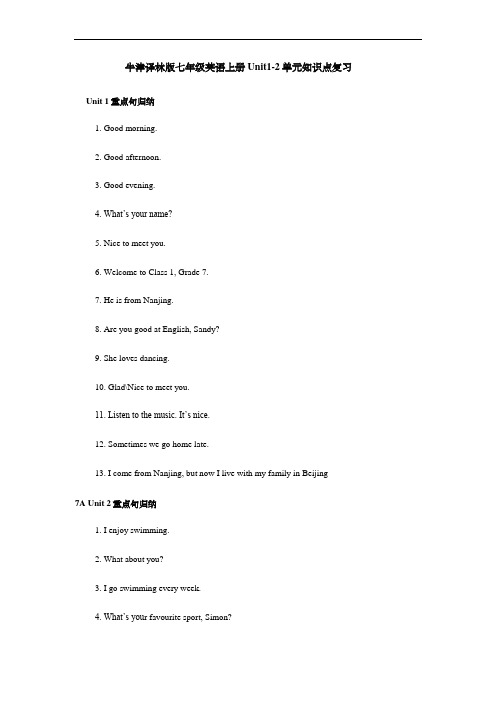
牛津译林版七年级英语上册 Unit1-2单元知识点复习 Unit 1重点句归纳1. Good morning.2. Good afternoon.3. Good evening.4. What’s your name?5. Nice to meet you.6. Welcome to Class 1, Grade7.7. He is from Nanjing.8. Are you good at English, Sandy?9. She loves dancing.10. Glad\Nice to meet you.11. Listen to the music. It’s nice.12. Sometimes we go home late.13. I come from Nanjing, but now I live with my family in Beijing7A Unit 2重点句归纳1. I enjoy swimming.2. What about you?3. I go swimming every week.4. What’s you r favourite sport, Simon?5. He is a new member of Huanghe Football Club.6. He looks strong and plays football very well.7. In his free time, he studies English.8. It makes him happy.9. I hope his dream comes true.10. How does he look? He looks strong.11. Li Hua also enjoys listening to music.12. Daniel sometimes watches ball games on TV.13. My mum often shops at weekends.14. Many of my students like sports.15. What else do you like to do?16. It makes me feel great.17. I read a lot of interesting books.18. Me too. Reading is fun.19. I am a member of our school basketball team.20. We often talk about basketball and watch basketball matches on TV.21. He is my hero.动词形式基础过关试题用所给动词的适当形式填空:1. Let’s _________(meet) my new classmates.2. He is good at ____________(dance) and I do well in __________(swim).3. Now he ________(live) with his family in Shanghai.4. Those students like ________(play) games.5. Now he _________(have) a nice house in his hometown.6. Now the little girl __________(not like) eating mangoes.7. What about _________(drink) some coffee? You look a little tired.8. Would you like to go ___________(shop) with us this evening?9. Listening to music makes me ___________(feel) happy.10. Those ________(play) coats are over there.11. Liu Xiang sometimes ________(study) English in his free time.12. The boy __________(not do) his homework on Friday evening.13. The old lady often _________(stay) at home to watch TV.14. ----__________(be) your mum good at cooking? ----Of course.15. Do you enjoy ________(walk) in the park?7A Unit 1~Unit 2基础过关测试根据中文写单词:1. ----Are you in _________(年级) Eight?----Of course not. I’m only 12 years old.2. I don’t think it is ________(真实的) unless you show it to me.3. There are twenty _________(成员) in the school football team.4. I often watch football matches at ___________(周末).5. His mother often ___________(购物) in Xinjiekou.用所给单词的适当形式填空:1. Now he _________(have) a nice house in his hometown.2. Now the little girl __________(not like) eating mangoes.3. Let’s _________(meet) my new cla ssmates.4. Liu Xiang sometimes ________(study) English in his free time.5. What about _________(drink) some coffee? You look a little tired.翻译词组:1. He usually _____________(看球赛) with his father on Sunday afternoon.2. Zhao Benshan always _________________(使我们开心).3. The old lady often _________(呆在家里) to watch TV.4. The tall boy doesn’t ____________(来自) Nanjing.5. The beautiful girl doesn’t like _____________(戴眼镜).单项选择:1. ----_________ does she look?----She looks very tall and slim.A. WhatB. WhenC. WhereD. How2. ----Which sound of the underlined letter is different from the others?A. deckB. denC. ebbD. eke3. Lily comes from Beijing, but now she __________ in Nanjing.A. liveB. livesC. is livingD. living4. ----_________ your twin sister good at Maths? ----Of course.A. AreB. IsC. DoD. Does5. ---- Sam, would you like to __________ with me?----Sorry, I have no bat. I have to stay at home to __________. A. play volleyball; watch TV B. play tennis; play table tennis C. play table tennis; read books D. play tennis; play volleyball。
[译林版]七年级英语上册Unit2知识梳理
![[译林版]七年级英语上册Unit2知识梳理](https://img.taocdn.com/s3/m/2a0cd23ead51f01dc381f157.png)
7A Unit2知识梳理一、同步知识梳理知识点1:let型祈使句(P18)(1)Let's celebrate!这是由let引导的祈使句,祈使句是英语的基本句型之一,这个句式常用来表示说话人的建议、请求、命令等。
它的句型是“let+人称代词宾格+动词原形”,即“let+sb+do+sth”。
eg: Let's go and see our English teacher.Let me help you find it.注:let's和let us略有不同,“let's+动词原形”结构表示祈使对象包括说话人和听话人双方在内,而“let us+动词原形”结构表示请求对方允许自己(第一人称复数)做某事时,这里的us 不包含听话人在内,不能缩写。
(2)let型祈使句的否定形式分两种:①含第三人称主语的祈使句的否定形式在句首加don't。
②含第一人称主语的祈使句的否定式不再句首加don't,而是用“let +sb+not+do”eg: Don't let him in.Let's not laugh at her.知识点2:Eddie, do you like any sports? 艾迪,你喜欢运动吗?(P18)(1) like vt. 反义词是dis like 不喜欢(2) sport此处为可数名词,意为“体育运动”eg:Tennis is a popular sport. 网球是一项很流行的运动。
知识点3:Yes, I like walking. 是的,我喜欢散步。
(P18)walking 名词,“散步,行走”(动词+ing 变成名词,也叫动名词),动词形式为walk, 意为“走,步行”eg:Walking in the morning is good for people.知识点4:really adv. (副词) 实际上,事实上;My father didn't really love her. 我爸爸实际上并不爱她。
- 1、下载文档前请自行甄别文档内容的完整性,平台不提供额外的编辑、内容补充、找答案等附加服务。
- 2、"仅部分预览"的文档,不可在线预览部分如存在完整性等问题,可反馈申请退款(可完整预览的文档不适用该条件!)。
- 3、如文档侵犯您的权益,请联系客服反馈,我们会尽快为您处理(人工客服工作时间:9:00-18:30)。
知识点
南涧县第三中学,汪洪武
October 15,2015
1.parents父母 parents是名词,意为“父母”,是复数形式 parents=father and mother父母亲 parent=father or mother父亲或母亲 My parents are teachers.我的父母亲是老师 2.That’s my family.那是我的一家。 family名词,意为“家;家庭”。family若指家庭 这个整体,谓语动词用单数,若指家庭里的全体 成员,谓语动词用复数。 Kate’s family is small.凯特的家庭是个小家庭。 His family are all here.他的一家人全在这儿了。 3.Those are my parents.那些是我的父母。
Well在此作感叹词,意为“好吧;嗯”,用在句 子开头。 Well, thank you.好吧,谢谢你。 (2)have a good day!过得愉快! 用于表达祝愿,祝愿对方一天里有好的心情和运 气。此句中的day还可用morning, evening等词 语代替。其答语用thank you./Thanks.回答。 ---Have a good morning!祝你 (们)上午玩得愉快! ---Thank you.谢谢你! Have a good time! 祝你们玩得愉快! Have a good trip!祝你(们)旅途愉快!
7.My grandfather and grandmother are in the first photo.在第一张中有我的祖父和祖母。 in the first photo.意为“在第一张中”。其中 first 为序数词,意为“第一”。 first “第一”,second“第二”, third”第三”。序 数词是表示顺序的词,其前常用定冠词the;若序 数词其已有形容词性物主代词,则不用定冠词 the。 My brother is in the first photo.我弟弟在第一张 照片中。 This is the first lesson.这是第一节课。 My mother is the first teacher in my life.我的妈 妈是我生命中的第一位老师。
8.In the next picture are my brothers, Bob and Eric.在接下来的那张照片里有我的兄弟们,鲍 勃和埃里克。 (1)next在此作形容词,意为“下一个的;接下来 的”。 Next one.下一个 I’ll go to kunming next week.下周我将去昆明。 (2)picture与photo的区别。 picture作“照片”讲时,可与photo互换。 Picture还有“图画”的意思。 Look at the picture, please. 请看这幅图片。 Can you take a photo of me?你能给我拍一张照 片吗?
Whose brother is he?他是谁的哥哥? 5.---Are those your parents?那是你的父母吗? ---Yes, they are.是的,他们是。 Are these /those …?意为“这些/那些是……吗?”,是 These/Those are…的一般疑问句形式。其肯定回答是 Yes, they are.其否定回答是No, they aren’t. ---Are these your books?这些是你的书吗? ---Yes, they are是的它们是。 Is this/that…?是are these/those…?的单数形式;其肯 定回答是Yes, it is.其否定回答是No, it isn’t. 6.Well ,have a good day!好吧,祝你们玩得愉快!
Байду номын сангаас
this( 这;这个)---these(这些) that(那;那个)---those(那些), 这四个词叫指示代词,this,that作限定词时,可 与单数名词连用, these,those作限定词时, 可与复数名词连用。“These/those are+复数 名词”,用来介绍两个或两个以上的人或物,意 为“这些/那些是……”。 These are my friends.这些是我的朋友。 Those are my classmates.那些是我的同学。 4.Who’s she?她是谁? Who是疑问代词,意为“谁”,who is/are…?是 对人或物进行提问的特殊疑问句,回答时,注意 根据人物性别选用恰当的人称代词。
---Who is he?他是谁? ---He is Jim. 他是吉姆。 ---Who are they?他们是谁? ---They are my grandparents. 他们是我的祖父 母。 ---Who are you? 你是谁? ---I am Sally.我是萨利。 Who 的宾格形式是whom,两者作宾语时可互换, 意为:“谁”;who的所有格形式是 whose, 意为:“谁的”。 ---Who/Whom do you meet?你遇见了谁? ---I meet my sisters.我见到我的姐妹们。
